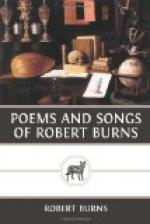A fornicator-loun he
call’d me,
An’ said my faut
frae bliss expell’d me;
I own’d the tale
was true he tell’d me,
“But, what the
matter?
(Quo’ I) I fear
unless ye geld me,
I’ll ne’er
be better!”
“Geld you! (quo’
he) an’ what for no?
If that your right hand,
leg or toe
Should ever prove your
sp’ritual foe,
You should remember
To cut it aff—an’
what for no
Your dearest member?”
“Na, na, (quo’
I,) I’m no for that,
Gelding’s nae
better than ’tis ca’t;
I’d rather suffer
for my faut
A hearty flewit,
As sair owre hip as
ye can draw’t,
Tho’ I should
rue it.
“Or, gin ye like
to end the bother,
To please us a’—I’ve
just ae ither—
When next wi’
yon lass I forgather,
Whate’er betide
it,
I’ll frankly gie
her ‘t a’ thegither,
An’ let her guide
it.”
But, sir, this pleas’d
them warst of a’,
An’ therefore,
Tam, when that I saw,
I said “Gude night,”
an’ cam’ awa’,
An’ left the Session;
I saw they were resolved
a’
On my oppression.
The Brigs Of Ayr
A Poem
Inscribed to John Ballantine, Esq., Ayr.
The simple Bard, rough
at the rustic plough,
Learning his tuneful
trade from ev’ry bough;
The chanting linnet,
or the mellow thrush,
Hailing the setting
sun, sweet, in the green thorn bush;
The soaring lark, the
perching red-breast shrill,
Or deep-ton’d
plovers grey, wild-whistling o’er the hill;
Shall he—nurst
in the peasant’s lowly shed,
To hardy independence
bravely bred,
By early poverty to
hardship steel’d.
And train’d to
arms in stern Misfortune’s field—
Shall he be guilty of
their hireling crimes,
The servile, mercenary
Swiss of rhymes?
Or labour hard the panegyric
close,
With all the venal soul
of dedicating prose?
No! though his artless
strains he rudely sings,
And throws his hand
uncouthly o’er the strings,
He glows with all the
spirit of the Bard,
Fame, honest fame, his
great, his dear reward.
Still, if some patron’s
gen’rous care he trace,
Skill’d in the
secret, to bestow with grace;
When Ballantine befriends
his humble name,
And hands the rustic
stranger up to fame,
With heartfelt throes
his grateful bosom swells,
The godlike bliss, to
give, alone excels.
’Twas when the
stacks get on their winter hap,
And thack and rape secure
the toil-won crap;
Potatoe-bings are snugged
up frae skaith
O’ coming Winter’s
biting, frosty breath;
The bees, rejoicing
o’er their summer toils,
Unnumber’d buds
an’ flow’rs’ delicious spoils,




